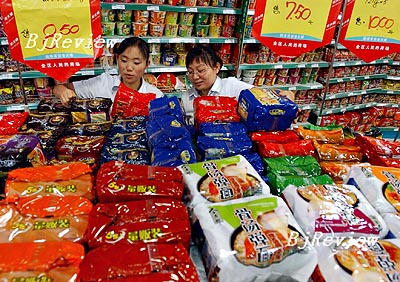
At the instigation of the China branch of the International Ramen Manufactures Association (IRMA), a dozen Chinese instant noodle brands, such as Master Kong and Uni-President, raised their noodle prices on July 26, the highest rising 40 percent. The joint price hike caught nationwide attention, leading some consumers and lawyers to complain about the instant noodle price hike to the National Development and Reform Commission (NDRC).
The NDRC, China's top pricing supervision body, ruled that the nationwide price hike for instant noodles was an act of illegal collusion between companies and the industry-based association.
The higher prices instituted by IRMA have "seriously distorted the market order and hampered fair competition in the industry," the NDRC said in a statement on its website.
The statement was issued after the commission created a team to investigate the prices of instant noodles last month.
The NDRC has pledged to nab anyone who colludes to drive up prices amid surging food costs.
Instant noodle prices were brought back to normal on the day after NDRC's notice. The curtain had been drawn on the instant noodle price hike, but people are still pondering the lessons learned from this incident.
Foxes and henhouses
In China, the established functions of industry associations are the following: serving the industry, disciplining the industry, promoting direct participation in drafting relevant laws and regulations; promulgating industry technology standards; participating in industry statistic analysis; taking on overall technological innovation; building up industry credibility, researching and carrying out intellectual property right protection; protecting the basic rights of industrial staff; providing legal assistance to member companies; and safeguarding fair competition.
During Beijing Review interviews, many experts said the IRMA totally disobeyed the function of an association and seriously distorted the market order.
After the investigation, the NDRC confirmed that the IRMA had, many times, organized companies to discuss the price hike of noodles in regards to range, time and plans. Moreover, the IRMA published the price hike briefing in an industry magazine, sending a signal to noodle producers and causing panic buying in some areas after the media reported the news. The NDRC stated these actions manipulated the market price.
"The backlog of legislation leads to such market disorder," said Dong Chengxiao, a lawyer in Beijing. "The market economy is in essence an economy ruled by law. Therefore, legislation must go first before the market order can be totally rectified."
Dong argued that the current industry association legislation has far lagged behind the development of the social economy. The rules and regulations guiding non-governmental organizations are the Regulations on the Registration of Social Organizations and Provisional Regulations for the Registration Administration of People-Run non-Enterprise Units enacted in 1998, as well as other local regulations. However, those regulations are more in principle and lack feasibility. The companies lack the careful layout of industry, quality certification and supervision, thus leading to chaotic operation of associations.
"Legislation is a key task," said Dong. "It must be clearly stated in law the nature, status, function, rights and obligations of industry associations, and which things are forbidden and which are restricted, and what kind of punishment they will get if they break the law."
"Supervision inefficiency is another disadvantage," Dong added.
In China, industry associations must be registered with civil affairs departments. After a series of interviews, Beijing Review found that the China branch of the IRMA is actually an illegal institution.
The IRMA was first established in Japan in March 1997. In 2002, the IRMA proposed to the Chinese Institute of Food Science and Technology (CIFST) to set up a China branch. CIFST then reported to the upper-level administrative department, which replied that China didn't have such regulations, but that China encouraged foreign institutions to set up branches in China to enhance communication.
In 2004, the China branch of IRMA was founded and staffed mainly from CIFST's noodle sector. This means that CIFST's noodle sector colluded with the instant noodle producers to launch a price hike in the name of the China branch of IRMA.
This illegal association has existed for three years without any supervision. After the instant noodle incident, the nature of the association was discovered and the civil affairs
| 